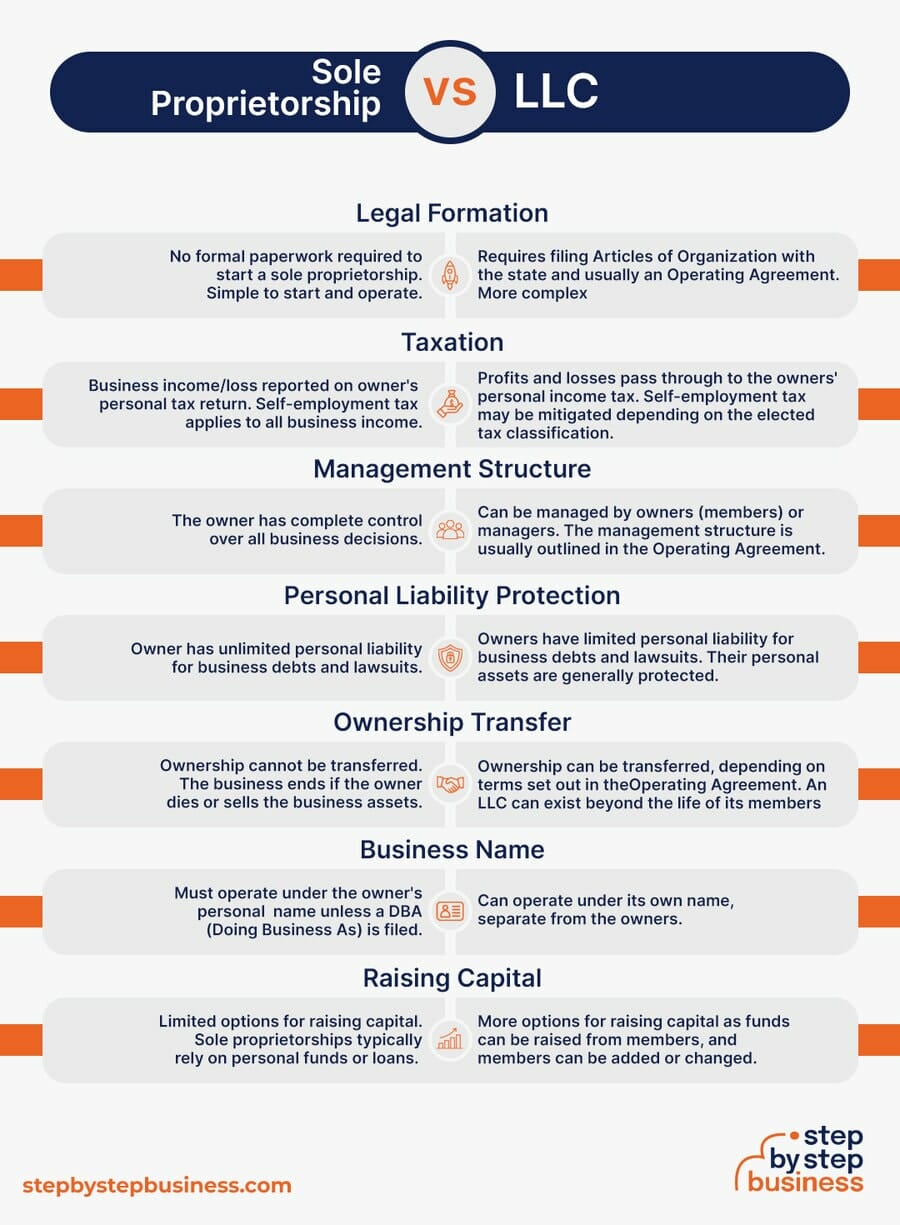If you’re in the process of starting a business, you may be considering forming a limited liability company (LLC). Before you do so, you shouldkno ...
Sole Proprietorship vs. LLC: A Comparison
Written by: Carolyn Young
Carolyn Young is a business writer who focuses on entrepreneurial concepts and the business formation. She has over 25 years of experience in business roles, and has authored several entrepreneurship textbooks.
Edited by: David Lepeska
David has been writing and learning about business, finance and globalization for a quarter-century, starting with a small New York consulting firm in the 1990s.
Published on October 11, 2021
Updated on May 22, 2023

When you decide to form your own business, the type of business entity you choose is an absolutely crucial decision. The first step is to educate yourself about the two most common types of business entities chosen by small business owners – sole proprietorship and limited liability company (LLC).

What Is a Sole Proprietorship?
A sole proprietorship is the simplest type of business entity to have and operate. It is a business with one owner and is not incorporated.
It’s also the default business form for a solopreneur. If you operate a business by yourself and don’t form any official business entity with the state, your business is automatically considered a sole proprietorship. There is no paperwork to file. You and the business are the same in a sole proprietorship, which means you are personally liable for the debts and obligations of the business.
In a sole proprietorship, the business name is your name, unless you register a DBA. “DBA” stands for “doing business as.” Simply put, it’s a name that is registered for a company to do business under that is not it’s legal business name. For instance, a sole proprietorship run by Thomas Smith might file a DBA to operate as “Smith’s Shirts”. A DBA name is also sometimes called a fictitious name or a trade name.
What Is an LLC?
An LLC is an increasingly popular business structure for startups, offering liability protection for ownership and greater flexibility than a corporation, particularly in terms of taxes. The LLC itself does not pay taxes. As a “pass-through” entity, income passes through the business to the owner or owners, who report it on their personal tax returns. An LLC is created by filing paperwork with your state, and nominal fees are involved.
An LLC offers its owner or owners, who are called members, considerable flexibility in terms of management. You can choose your management and operational structure and decide how you want to be taxed.
Your LLC can have a single member or multiple members, all of whom have personal liability protection, meaning your personal assets are not at risk if you cannot pay business debts or are involved in a lawsuit.
Sole Proprietorship vs. LLC
Legal Formation
To form a sole proprietorship, you need to do nothing but start doing business. However, depending on your location and type of business, you may need certain licenses and permits. Check with your state and municipality to find out what is required.
Forming a sole proprietorship is the least expensive and easiest type of business entity to form.
A sole proprietor does not have to file anything annually other than taxes and business license and permit renewals. There are no legal management requirements.
In an LLC, the formation requires more paperwork – the articles of organization and the operating agreement. It is recommended that an attorney assist with the operating agreement to make sure that all bases are covered. These forms vary by state but can generally be filed online. You’ll need to fill out the LLC name, the name and address of the registered agent, the names of the LLC owners, and in some states, the way the LLC will be managed. Fees are generally around $100.
A registered agent is the person or company that sends and receives legal documents on behalf of your LLC. The registered agent can be a member of the LLC, or you can choose a third party such as an attorney, or a company that offers registered agent services. Most states require that you have a registered agent. The agent must be a resident of the state where you do business, or a corporation that is authorized to do business in your state.
An LLC may also need specific licenses and permits and may also choose to have a DBA.
Many states also require that LLCs file annual reports. In a multiple-member LLC, members need to hold periodic meetings and follow the letter of the operating agreement. Paperwork will also be required to dissolve the LLC.
Taxation
A sole proprietorship is considered a “pass through” entity, which means the business itself does not pay taxes. The sole proprietor reports the business income on their personal tax return and pays taxes at their personal income tax rate.
As previously mentioned, an LLC is also a “pass through” entity and is not taxable. In the case of corporations, the corporation is taxed as well as the dividends shareholders receive, which is sometimes referred to as double taxation.
LLC owners may be eligible for the 20% pass-through deduction that was part of the Tax Cuts and Jobs Act, meaning that they can deduct up to 20% of the business income. An LLC can also choose to be taxed as a corporation or partnership if it is determined to be beneficial to the company.
A multi-member LLC must also file form 1065 with the IRS, which is the Return of Partnership Income. Attached to this will be form K-1s for each member showing their share of the business income.
Both sole proprietorships and LLCs must pay payroll taxes if they have employees, collect state and local sales tax, and are responsible for paying self-employment taxes. Some areas do collect different taxes for LLCs, so you should check the laws of your state and municipality.
Management Structure
In a sole proprietorship, it’s simple – the owner is in control of all aspects of the business. The owner can hire employees, take on debt, and manage all operations.
An LLC with only one member is much the same. But a multi-member LLC is more complex. An LLC with multiple members needs an operating agreement, which specifies each member’s ownership interest and the management structure, including each member’s role and responsibilities. It also will specify the voting rights of the members, which usually coincides with their ownership percentage.
Most states do not require an operating agreement, but it is highly recommended that you have one in place so that the ownership and management structure of the LLC are clearly stated in writing.
Personal Liability Protection
In a sole proprietorship, the owner is the business and is personally liable for all debts, and if the business goes bankrupt the owner must personally file for bankruptcy. If the business is sued, the sole proprietor is personally liable, and their personal assets are at risk.
An LLC is a separate entity from the owners and has its own obligations, therefore LLC members are not personally liable for the obligations of the business. If the business goes bankrupt, the owners can file for business bankruptcy, but their personal assets are not involved. However, if a member personally guarantees a business loan for the LLC, they are personally liable for that debt. The owners are also liable if they commit fraud or are negligent.
Making a Choice Between a Sole Proprietorship and an LLC
Sole proprietorships are simple and inexpensive, so many small business owners choose to be sole proprietors. The biggest disadvantage for sole proprietors is the personal liability. You may think that nothing will go wrong, but if it does, your personal assets, including your home, could be at risk.
An LLC offers the advantages of personal liability protection and tax flexibility. Most people who choose an LLC do so because they want to protect their personal assets. An LLC is more expensive, and requires more paperwork, but it’s a small price to pay for peace of mind.
Here’s a guide on how to change from a Sole Proprietorship to an LLC.
But it’s a good idea to consult with an attorney to determine the best entity for you and your business.
Sole Proprietorship vs. LLC: A Comparison
- What Is a Sole Proprietorship?
- What Is an LLC?
- Sole Proprietorship vs. LLC
- Making a Choice Between a Sole Proprietorship and an LLC
Subscribe to Our Newsletter
and gain insider access to cutting-edge business insights and trends.
Featured Resources

What Is a Domestic LLC?
Published on February 14, 2023
Read Now

10 Best LLC Formation Services
Published on August 22, 2022
If you’re starting an LLC, the business entity formation process is one of the first and most important hurdles. This step can be terribly complex ...
Read Now

How to Choose Your LLC Tax Status
Published on January 25, 2022
When starting a business, many entrepreneurs choose to form a limited liability company (LLC) because it offers real benefits, including seriousliab ...
Read Now
Comments